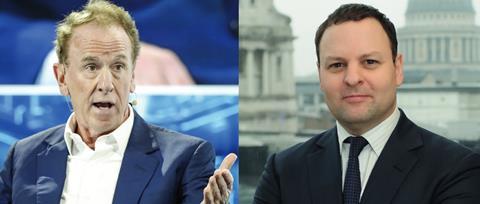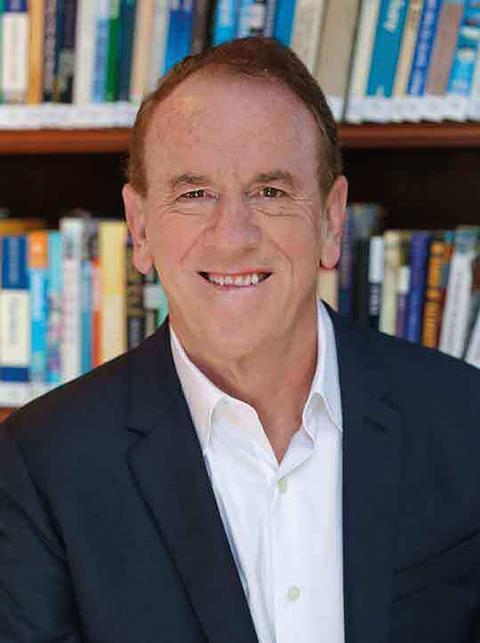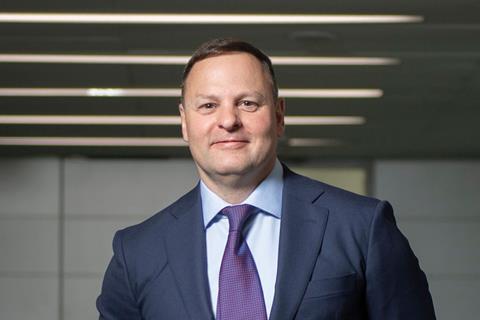John B. Quinn and Richard East tell Paul Rogerson what it’s like to run the world’s ‘most feared’ law firm – and why they have been so successful in exploiting the London market

There is only one thing in life worse than being talked about,’ said Oscar Wilde, ‘and that is not being talked about.’ John B. Quinn, one of the world’s top litigation lawyers, would probably agree. So it seems appropriate that we meet in London’s Hotel Cafe Royal, site of the famous Grill Room where the Irish dramatist and wit once held court.
Few major-league law firms revel in provocative grandstanding, but litigation-only outfit Quinn Emanuel Urquhart & Sullivan is an exception. Quinn Emanuel Trial Lawyers, as it is branded in its home market of the United States, revels in its status as ‘the world’s most-feared law firm’.
This forbidding accolade, bestowed annually by the management consultancy BTI, is based on interviews with in-house counsel. Quinn Emanuel has landed top spot in three of the last four years.
‘I guess we’re kind of proud of that,’ Quinn says. ‘In our world, clients are not looking for shrinking violets. They’re looking for someone to stand up for them when they’re in trouble. People who inspire respect, or indeed fear, in the other side.
‘You [can] get cases resolved without trial when your opponent thinks that settling is better than going against their adversary in court. They blink. And I think our results speak for themselves,’ he adds.
Clients don’t come bigger than many of those who appear on Quinn Emanuel’s roster. Its A-listers reportedly include Elon Musk, Tesla, WeWork founder Adam Neumann, and the actor Alec Baldwin.
'In our world, clients are not looking for shrinking violets. They’re looking for someone to stand up for them when they’re in trouble. People who inspire respect, or indeed fear, in the other side'
John B. Quinn, founder, Quinn Emanuel Urquhart & Sullivan
Corroboration of the firm’s heft is amply supplied on the firm’s website. Under ‘our most notable victories’, the opening paragraph reads: ‘Obtaining a jury verdict of over $100m almost never happens during the careers of most lawyers. Quinn Emanuel has obtained five nine-figure jury verdicts.’
Feel the fear.
So what of those lawyers? Quinn is joined at the Hotel Café Royal by solicitor-advocate Richard East, founding partner of the firm’s London office. East recently signed off on a policy that thrust Quinn Emanuel on to the business pages for reasons only indirectly related to its mettlesome advocacy. In May the firm hiked the salaries of its newly qualified solicitors to a remarkable £180,000 a year, further stoking the NQ pay war.

England’s elite firms, which have bumped NQ pay to around £150,000, are struggling to stay in its slipstream. As one magic circle partner told the Financial Times: ‘Juniors sometimes protest, “if I am working this hard, I might as well join a US firm”.’
Quite. Although, as East explains, in Quinn Emanuel’s case it is not quite that simple. ‘Because we’re a litigation-only firm, we tend to sue a lot of the institutions and clients of those [indigenous UK] firms,’ he says. ‘Banks, for example. When we come to hire people, often we find we can’t because they’ve spent three years representing, say, Goldman Sachs, and that gives the bank a basis to try and disqualify us from acting on a case.
‘What that has meant over the last three to four years is a lot of our talent has come from other jurisdictions,’ he adds. ‘New Zealand, Australia, India, Canada – other common law jurisdictions. We require [recruits] to take the SQE to requalify as an English lawyer.’
As for ‘working this hard’, that is a given. It has become a cliche to assert that the gilded youth of the Square Mile elite essentially surrender their waking hours – and a great many small hours too – in the service of clients. But while this can be said to be a Faustian pact, there are many lawyers out there who would love to be Doctor Faustus.
After all, a few years down the road, there awaits eye-watering wealth that will elevate a fortunate few into the fabled 0.01% of the global super-rich. To reach for a sporting analogy, solicitors can do with their brains what Premier League footballers do with their feet (and their brains). A handful of the top partners at the leading US law firms in London are now understood to be paid more than $15m (£11.5m), while the average take at Quinn is reported to be about $6m.
So how hard do the juniors work? Quinn is blunt – there is no such thing as a 40-hour week for his lawyers. He leans across the table: ‘I’ll let you in to a little secret. Practising law at the highest level is labour-intensive. There are no shortcuts. We don’t apologise for that.’
As a business model, there is no doubt it works. Despite being litigation-only, Quinn Emanuel recently ranked ninth in a ranking of the top 50 US firms in London by revenue.
‘Apart from us, all of the other top 10 firms are full-service,’ stresses East. ‘We’re focused on one practice area. I think that’s pretty extraordinary.

‘Look at the likes of Herbert Smith [Freehills] and yes, they’re doing £400m, but some firms have two to three times the lawyers we have. We’re hard-working, entrepreneurial. And, you know, not every lawyer wants to work 2,500 to 3,000 hours a year. Not every lawyer is as ambitious as we are. It is about finding the right people.’
The latter statistic is worth unpacking. The arithmetic suggests a Quinn Emanuel lawyer is billing the equivalent of 10-11 hours per ‘official’ working day, discounting (perhaps notional) weekends, and holidays. In reality, some days they will be billing rather more. An established associate paid over £200,000 can be charged out at hundreds of pounds an hour, earning a hefty multiple of their own salary for the partners.
Of course, Quinn Emanuel is hardly unique in this regard. ‘I don’t think our lawyers are any different from those at Skaddens, Freshfields or Slaughter and May,’ says East. ‘They work hard in those firms, for sure. The difference is, come to our firm and we can absolutely guarantee you’ll work at the top of the market, and be involved in real litigation.
‘If you’re in a magic circle firm, you may not see a trial. I’ve heard of situations where partners in those firms have never been involved in a trial.
‘People in our firm have two to three times the experience they would get in another firm in terms of less litigation, and more conflicts. We can take on more because we’re not conflicted out.’
Feeding the beast
Overpaid, overworked and over here, detractors grumble sourly. But the interlopers are not going anywhere. How far can US firms like Quinn Emanuel go in London?
I mention a thought-provoking paper on the future of the magic circle published a couple of years ago by Christopher Saul, former senior partner at Slaughter and May. While profitability at what was then the Big Four – Allen & Overy, Clifford Chance, Freshfields and Linklaters – has soared, it ‘pales’ in comparison with US titans such as Davis Polk and Latham & Watkins, Saul stressed. ‘How can the magic circle avoid being a training service for the leading US firms, gradually surrendering “brand charisma” in the process?’ he asked, witheringly.
Since then A&O has sealed its transatlantic merger with Shearman & Sterling. But the point remains germane.
‘I would ascribe to [Saul’s] view,’ says East, who was previously with US firms Cadwalader and Kirkland & Ellis. ‘US firms are more entrepreneurial, they present better opportunities to ambitious lawyers, they get closer to clients. The US is very adept at finding very specific areas where they can excel – such as private equity hedge funds – and relationships with clients are not institutionalised. They’re much more about personal relationships. I think we’ll continue to eat the lunch of the UK firms.’
Lunch is now served on bigger plates, too. Both men allude to the proliferation of common law dispute resolution forums, from Singapore to Abu Dhabi. Build it, and the lawyers will come.
‘There’s definitely a significant change in the global outlook for litigation,’ says Quinn. ‘A lot of these countries are trying to attract inward investment and then build a court system around a [special economic zone]. This presents more opportunity for us, because a lot of these systems are based on English law. I don’t know whether it can be said there is just more litigation.’

When East was recruited by Quinn in 2008 to set up the firm’s London outpost, he started at the kitchen table with a laptop.
‘Sixteen years ago,’ East recalls, ‘there was not a single firm that went out of their way to sue the banks, for example. Now there are over a dozen litigation boutiques and there’s capital available in the form of litigation funders. So there’s a huge influx of talent and capital into litigation work.’
And so we broach the vexed subject of costs, upon which both men have forthright views. A Civil Justice Council review of litigation funding is expected to publish an interim report this summer, with the prospect of a cap on funders’ returns and regulation of the sector.
'We [in the UK] have an odd relationship with justice. It’s important that people have access to the courts and yet at the same time you have this penal costs system, where if you bring a claim and lose you pay your opponent’s costs'
Richard East, founding partner, Quinn Emanuel London
Across the Atlantic, meanwhile, the US Chamber of Commerce has long lobbied for curbs on third-party funders. It has even gone so far as to argue that foreign investment in US litigation poses national security risks.
‘In the US, trial lawyers – the tort bar – are among the least popular professions,’ Quinn wryly notes. ‘There have been a lot of calls for regulation, but they haven’t gotten any traction at all. I don’t think that’s going to change.’
‘As lawyers, we should be allowed to enter into arrangements that allow people to defend or bring claims,’ East adds. ‘So I don’t see the need for regulation.’
‘We [in the UK] have an odd relationship with justice,’ he says. ‘It’s important that people have access to the courts and yet at the same time you have this penal costs system, where if you bring a claim and lose you pay your opponent’s costs. So the funders have come in and taken on the adverse costs risks. They provide a service.’
East cites the Post Office claims as the ‘perfect example’ of this. As the celebrated campaigner Alan Bates has written, it was only by means of litigation funding that he and his fellow sub-postmasters were able to take the Post Office to the High Court and achieve a settlement.
The outlook was muddied by Rishi Sunak’s general election announcement. After the Supreme Court cast doubt on the validity of funding agreements in PACCAR Inc & Ors v Competition Appeal Tribunal & Ors last July, former lord chancellor Alex Chalk pledged retrospective legislation to address the problem. But his bill fell in the parliamentary washup. We still await notice what Labour’s lord chancellor, Shabana Mahmood, will do as manifold priorities demand parliamentary time. There was nothing specific in Wednesday’s King’s speech.
A force of nature
John B. Quinn is not so much driven as jet-propelled. He founded Quinn Emanuel Urquhart & Sullivan in Los Angeles in 1986, since when the firm has grown to 35 offices on four continents. Over 1,100 lawyers generate more than $1.6bn in annual revenue. In London, the firm’s revenues increased 47% in 2023, with profits rising by 60% to £153.6m. As of January, Quinn Emanuel had 29 partners in the UK capital and 76 associates.
Quinn has twice completed Ironman triathlons, and is also a renowned art collector and bibliophile. In 2016, he opened the Museum of Broken Relationships on Hollywood Boulevard, and in 2021 launched an artist-in-residence program at Quinn Emanuel to create a platform for emerging and mid-career artists in greater Los Angeles.
Quinn has his own, very well-populated website, johnbquinn.com. It hosts his blog, newsletter and podcast, in which he shares his ‘thoughts and insights’ about the law.
Desire for reform
‘We should convert to the US system where there are no adverse costs, though it’s probably never going to happen,’ opines East. ‘That would create an enormous amount of opportunity to bring claims. The fear in England is that there will be an explosion of [lawsuits]. But you can’t have access to justice without the problem of people bringing unmeritorious claims.
‘This idea of regulation and what we’ve done with the PACCAR decision is stupid – suicidal – for funding,’ he adds. ‘Because you’re taking big risks when you fund litigation – it’s a binary outcome. You can end up swallowing your own costs, and then you pay your opponent’s costs. These are very, very significant risks.
‘You have to allow the funders to properly price that as an investment – and usually funders are not spending their own money. They’re often backed by investment funds, hedge funds, private equity, sovereign wealth funds. They need to attract capital and be able to deploy that capital. If you start to restrict how funders fund it won’t attract that money any more and you’ll end up squeezing off the market.’
Lawyers too need to be ‘freed up’ by being able to ‘take on engagements in a way that makes economic sense’ he adds. ‘At the moment, we’re still restricted, we either have to do CFAs [conditional fee agreements] or DBAs [damages-based agreements], we can’t do a combination of them. And actually, the perfect way to finance a case would be a combination of a CFA and DBA.’
Time is money, and more so for this duo than most. Quinn is tapping at his phone. I wonder idly if it’s Elon or a famous actor. John B. Quinn was, after all, general counsel of the Academy of Motion Picture Arts and Sciences, which hands out the Oscars, for 33 years.
Perhaps it is a signal to wrap up. So I do. In a career for which ‘stellar’ appears an inadequate epithet, there must have been the odd blip. Quinn ruminates.
‘I hated losing my first trial,’ he replies. ‘I won three and then I lost one. That took some getting used to. I enjoy winning as much as I ever did, and I hate losing just as much.’
My last question is almost rhetorical, given that Quinn has been quoted as saying he has given no thought to mortality. Now in his early 70s, has he ever contemplated retirement?
‘I don’t know that word,’ he deadpans, with a wave of a hand.































2 Readers' comments